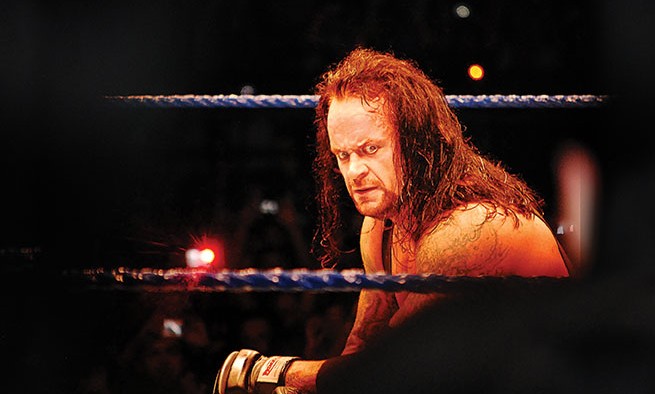 Social Sciences
Social Sciences
The Great American Bash

For a young Brandon Parry, the allure of professional wrestling was escapism. He was skinny and allergic to the gym, but he could lose himself watching these hulking behemoths on TV throw each other around with a grace and power bordering on performance art.
Parry has grown up, and he still loves pro wrestling. Now he’s not only drawn to the fantasy of the sport, but also to its ability to reflect reality—about complex ideas like nationalism and racism.
In his senior research paper, “All-American Babyfaces, Un-American Heels,” for which he won a $1,000 “best thesis” award from the UO Libraries, Parry (top right) illustrates how perceptions and prejudices that grip the national consciousness show up in pro wrestling characters with names like Hulk Hogan, Triple H, Rey Mysterio, and the Undertaker (above).
His most salient example is the character Muhammad Hassan, who joined the World Wrestling Entertainment lineup after the terror attacks of September 11, 2001. As conceived by WWE, Hassan was an Arab American whose attempts to fit in gradually devolved into hostility toward his adopted country. The character was discontinued after a controversial WWE “terrorism” storyline coincided with the 2005 London bombings.
Because WWE audiences were meant to reject Hassan as a villain or “heel”—even though he is Arab American and makes appeals for our understanding—Parry argues that he is the embodiment of a slanted viewpoint rooted in the global war on terror: the nation is at risk of attack by Arabs, therefore it cannot sustain civil rights such as those sought by Arab Americans.
It scarcely needs to be added, then, that Hassan’s evolution into an Islamic extremist ends with his defeat by a true patriot—the Undertaker—during an event that WWE titled “The Great American Bash.”
 For Parry (left), it’s no great leap to draw a connection between how we are meant to treat the larger-than-life characters in the “squared circle”—and how we treat those around us in the real world.
For Parry (left), it’s no great leap to draw a connection between how we are meant to treat the larger-than-life characters in the “squared circle”—and how we treat those around us in the real world.
“In real life, if enough individuals think of you as something, then that can effectively be what you are,” he wrote in his paper. “Post-9/11 US nationalist rhetoric began associating Arab, Muslim and . . . ‘Middle Eastern’ identity with a threat. In the sensationalized and signifying world of professional wrestling, we can see through the presentation of Muhammad Hassan . . . the evolution of this discourse.”
A 2014 graduate with degrees in history and ethnic studies, Parry defends pro wrestling’s relevance for research by noting that it belongs to that category of the American experience that we tend to elevate above all others: popular culture.
“America doesn’t put on pedestals their philosophers and poets,” Parry said in an interview. “For me, as a historian, popular culture distills things into very digestible, bite-size pieces, so that in 2050 you can look back and get an idea of what people thought about society in 2015.”
—By Matt Cooper
—Photo credit of wrestler: CC by SA 2.0


 Twitter
Twitter Facebook
Facebook Forward
Forward